Social Cognitive Theory: Factors, Implications, and Case Studies
VerifiedAdded on 2022/11/30
|9
|2193
|412
Essay
AI Summary
This essay provides an overview of the Social Cognitive Theory (SCT), propounded by Albert Bandura, which explores how individuals learn through observation, experience, and social interaction. The essay delves into the core factors of SCT: behavioral, environmental, and personal. It explains how these factors interact, influencing human behavior, self-efficacy, and observational learning. The paper discusses how people learn by observing others and the consequences of their actions. The essay also examines the implications of SCT in various contexts, including education, psychology, and communication, illustrated through several case scenarios. It also covers the role of self-efficacy, behavioral capability, and expectations, providing a comprehensive analysis of SCT and its application in understanding human behavior and learning processes. References are included to support the arguments presented.

Paraphrase This Document
Need a fresh take? Get an instant paraphrase of this document with our AI Paraphraser

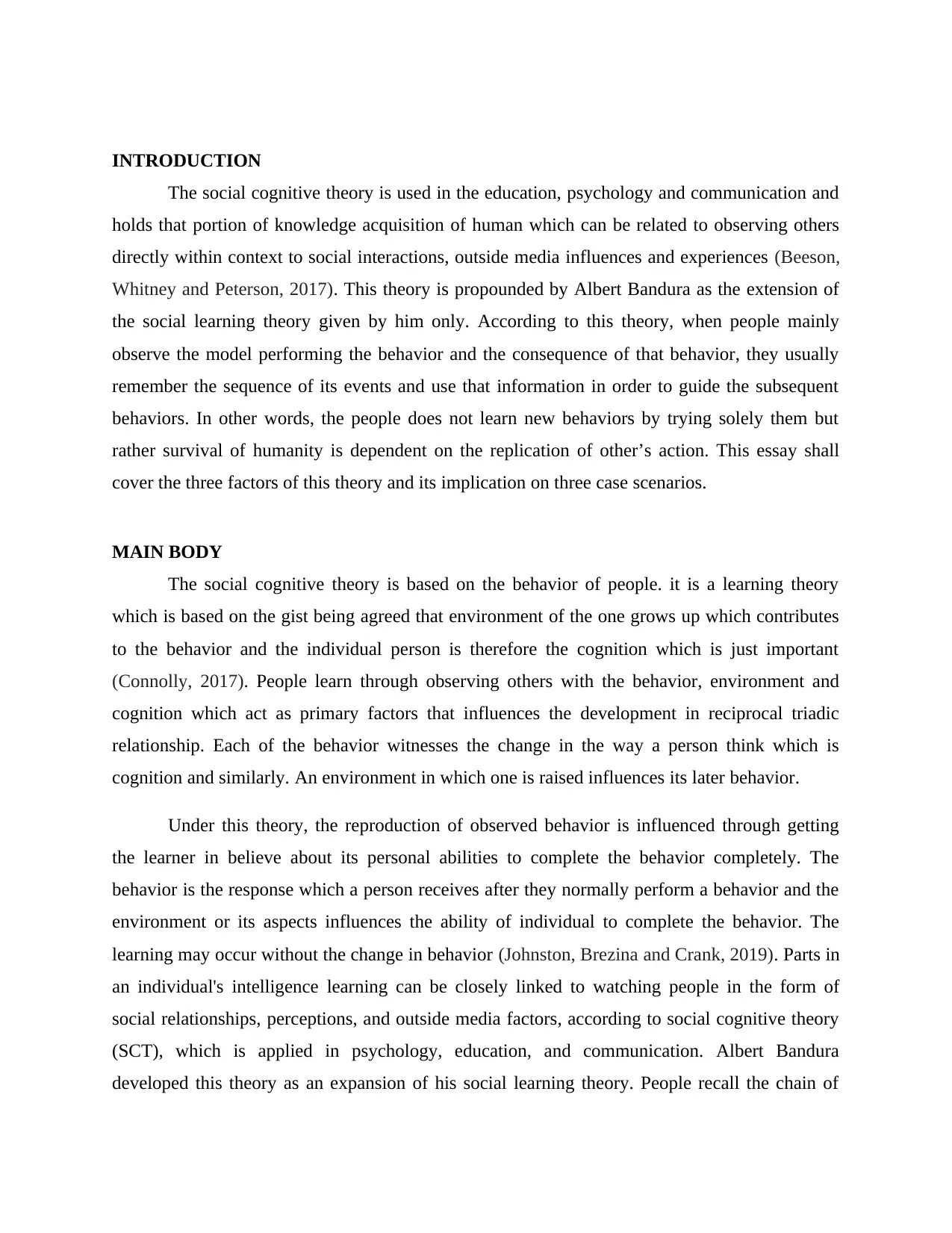
INTRODUCTION
The social cognitive theory is used in the education, psychology and communication and
holds that portion of knowledge acquisition of human which can be related to observing others
directly within context to social interactions, outside media influences and experiences (Beeson,
Whitney and Peterson, 2017). This theory is propounded by Albert Bandura as the extension of
the social learning theory given by him only. According to this theory, when people mainly
observe the model performing the behavior and the consequence of that behavior, they usually
remember the sequence of its events and use that information in order to guide the subsequent
behaviors. In other words, the people does not learn new behaviors by trying solely them but
rather survival of humanity is dependent on the replication of other’s action. This essay shall
cover the three factors of this theory and its implication on three case scenarios.
MAIN BODY
The social cognitive theory is based on the behavior of people. it is a learning theory
which is based on the gist being agreed that environment of the one grows up which contributes
to the behavior and the individual person is therefore the cognition which is just important
(Connolly, 2017). People learn through observing others with the behavior, environment and
cognition which act as primary factors that influences the development in reciprocal triadic
relationship. Each of the behavior witnesses the change in the way a person think which is
cognition and similarly. An environment in which one is raised influences its later behavior.
Under this theory, the reproduction of observed behavior is influenced through getting
the learner in believe about its personal abilities to complete the behavior completely. The
behavior is the response which a person receives after they normally perform a behavior and the
environment or its aspects influences the ability of individual to complete the behavior. The
learning may occur without the change in behavior (Johnston, Brezina and Crank, 2019). Parts in
an individual's intelligence learning can be closely linked to watching people in the form of
social relationships, perceptions, and outside media factors, according to social cognitive theory
(SCT), which is applied in psychology, education, and communication. Albert Bandura
developed this theory as an expansion of his social learning theory. People recall the chain of
The social cognitive theory is used in the education, psychology and communication and
holds that portion of knowledge acquisition of human which can be related to observing others
directly within context to social interactions, outside media influences and experiences (Beeson,
Whitney and Peterson, 2017). This theory is propounded by Albert Bandura as the extension of
the social learning theory given by him only. According to this theory, when people mainly
observe the model performing the behavior and the consequence of that behavior, they usually
remember the sequence of its events and use that information in order to guide the subsequent
behaviors. In other words, the people does not learn new behaviors by trying solely them but
rather survival of humanity is dependent on the replication of other’s action. This essay shall
cover the three factors of this theory and its implication on three case scenarios.
MAIN BODY
The social cognitive theory is based on the behavior of people. it is a learning theory
which is based on the gist being agreed that environment of the one grows up which contributes
to the behavior and the individual person is therefore the cognition which is just important
(Connolly, 2017). People learn through observing others with the behavior, environment and
cognition which act as primary factors that influences the development in reciprocal triadic
relationship. Each of the behavior witnesses the change in the way a person think which is
cognition and similarly. An environment in which one is raised influences its later behavior.
Under this theory, the reproduction of observed behavior is influenced through getting
the learner in believe about its personal abilities to complete the behavior completely. The
behavior is the response which a person receives after they normally perform a behavior and the
environment or its aspects influences the ability of individual to complete the behavior. The
learning may occur without the change in behavior (Johnston, Brezina and Crank, 2019). Parts in
an individual's intelligence learning can be closely linked to watching people in the form of
social relationships, perceptions, and outside media factors, according to social cognitive theory
(SCT), which is applied in psychology, education, and communication. Albert Bandura
developed this theory as an expansion of his social learning theory. People recall the chain of
⊘ This is a preview!⊘
Do you want full access?
Subscribe today to unlock all pages.

Trusted by 1+ million students worldwide
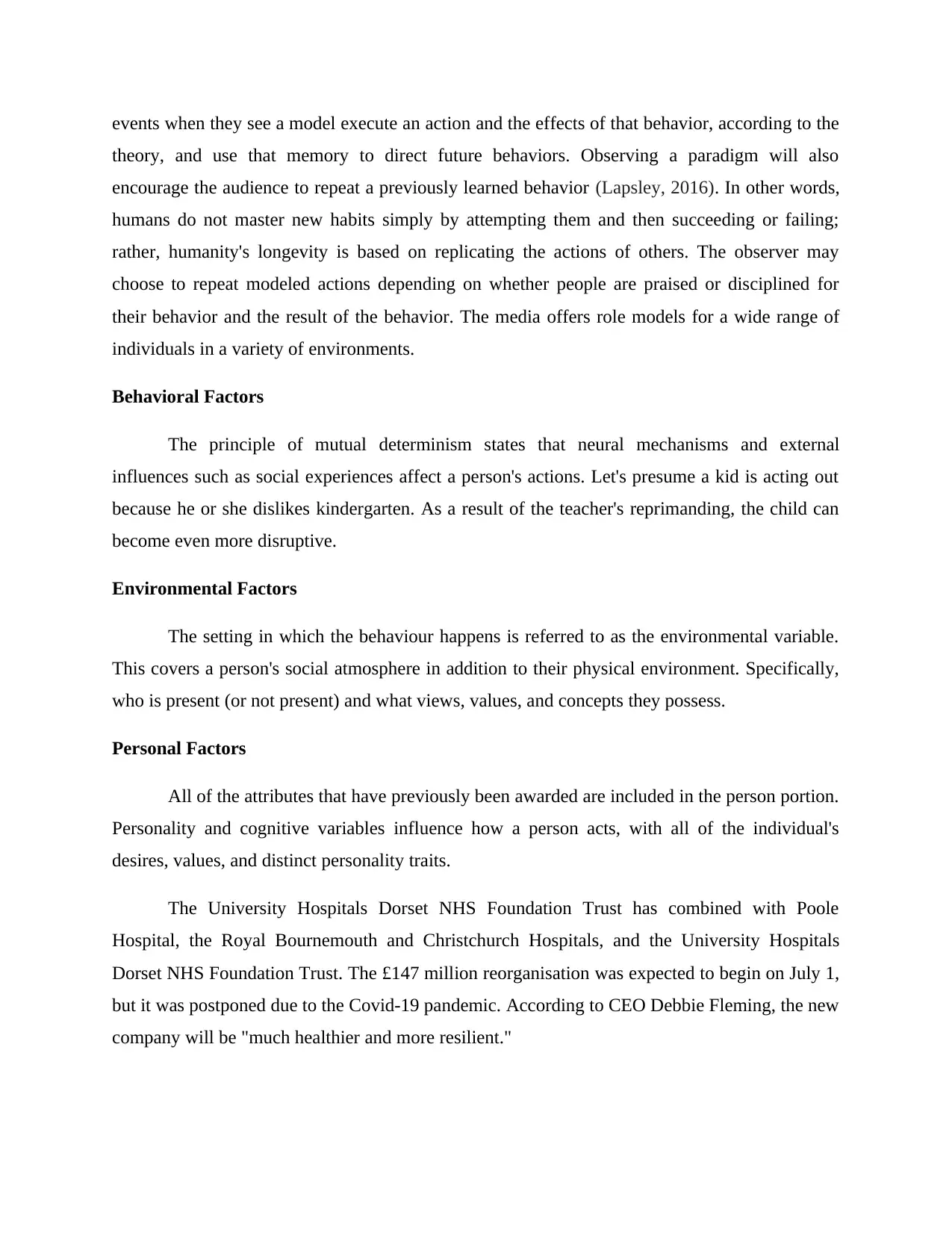
events when they see a model execute an action and the effects of that behavior, according to the
theory, and use that memory to direct future behaviors. Observing a paradigm will also
encourage the audience to repeat a previously learned behavior (Lapsley, 2016). In other words,
humans do not master new habits simply by attempting them and then succeeding or failing;
rather, humanity's longevity is based on replicating the actions of others. The observer may
choose to repeat modeled actions depending on whether people are praised or disciplined for
their behavior and the result of the behavior. The media offers role models for a wide range of
individuals in a variety of environments.
Behavioral Factors
The principle of mutual determinism states that neural mechanisms and external
influences such as social experiences affect a person's actions. Let's presume a kid is acting out
because he or she dislikes kindergarten. As a result of the teacher's reprimanding, the child can
become even more disruptive.
Environmental Factors
The setting in which the behaviour happens is referred to as the environmental variable.
This covers a person's social atmosphere in addition to their physical environment. Specifically,
who is present (or not present) and what views, values, and concepts they possess.
Personal Factors
All of the attributes that have previously been awarded are included in the person portion.
Personality and cognitive variables influence how a person acts, with all of the individual's
desires, values, and distinct personality traits.
The University Hospitals Dorset NHS Foundation Trust has combined with Poole
Hospital, the Royal Bournemouth and Christchurch Hospitals, and the University Hospitals
Dorset NHS Foundation Trust. The £147 million reorganisation was expected to begin on July 1,
but it was postponed due to the Covid-19 pandemic. According to CEO Debbie Fleming, the new
company will be "much healthier and more resilient."
theory, and use that memory to direct future behaviors. Observing a paradigm will also
encourage the audience to repeat a previously learned behavior (Lapsley, 2016). In other words,
humans do not master new habits simply by attempting them and then succeeding or failing;
rather, humanity's longevity is based on replicating the actions of others. The observer may
choose to repeat modeled actions depending on whether people are praised or disciplined for
their behavior and the result of the behavior. The media offers role models for a wide range of
individuals in a variety of environments.
Behavioral Factors
The principle of mutual determinism states that neural mechanisms and external
influences such as social experiences affect a person's actions. Let's presume a kid is acting out
because he or she dislikes kindergarten. As a result of the teacher's reprimanding, the child can
become even more disruptive.
Environmental Factors
The setting in which the behaviour happens is referred to as the environmental variable.
This covers a person's social atmosphere in addition to their physical environment. Specifically,
who is present (or not present) and what views, values, and concepts they possess.
Personal Factors
All of the attributes that have previously been awarded are included in the person portion.
Personality and cognitive variables influence how a person acts, with all of the individual's
desires, values, and distinct personality traits.
The University Hospitals Dorset NHS Foundation Trust has combined with Poole
Hospital, the Royal Bournemouth and Christchurch Hospitals, and the University Hospitals
Dorset NHS Foundation Trust. The £147 million reorganisation was expected to begin on July 1,
but it was postponed due to the Covid-19 pandemic. According to CEO Debbie Fleming, the new
company will be "much healthier and more resilient."
Paraphrase This Document
Need a fresh take? Get an instant paraphrase of this document with our AI Paraphraser
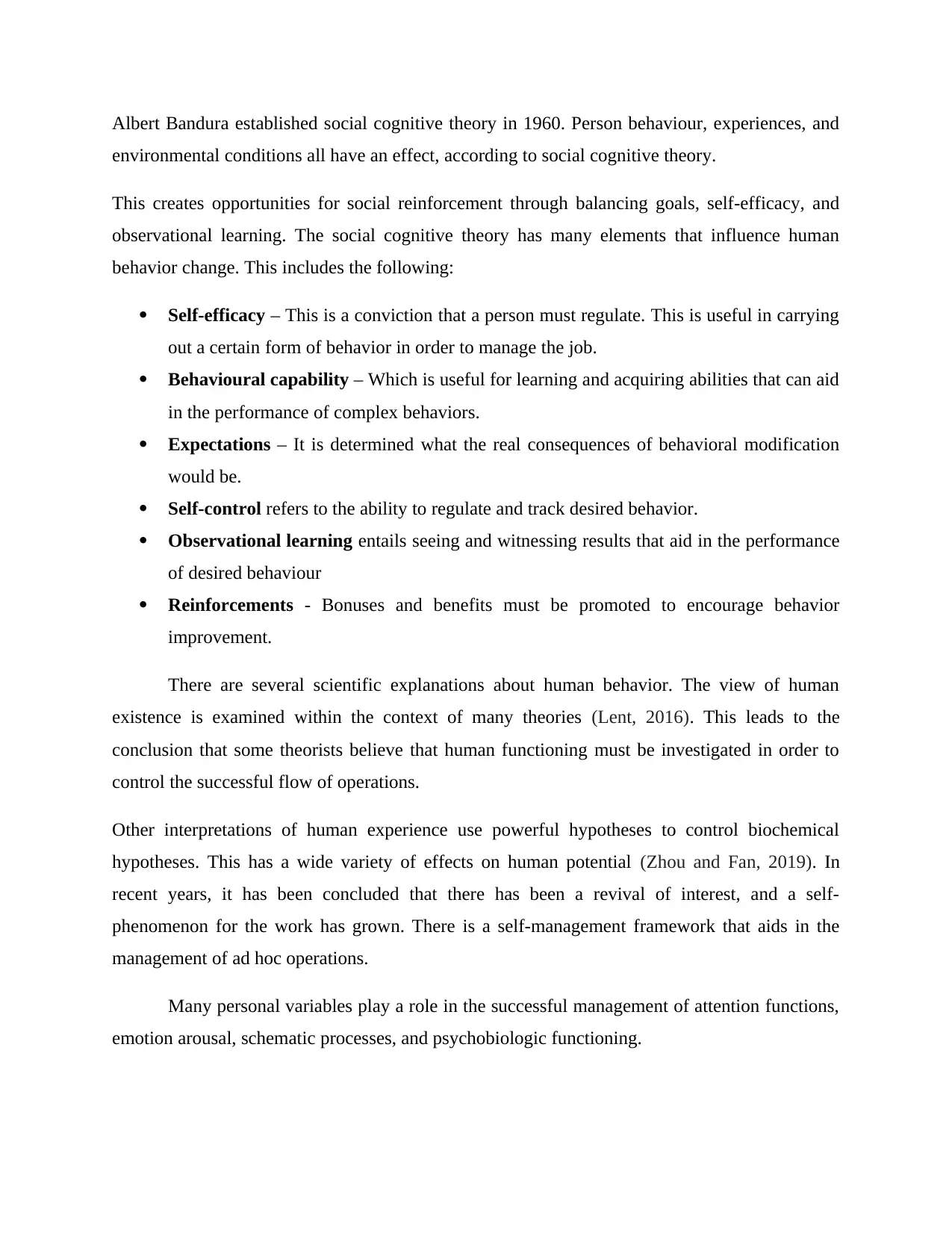
Albert Bandura established social cognitive theory in 1960. Person behaviour, experiences, and
environmental conditions all have an effect, according to social cognitive theory.
This creates opportunities for social reinforcement through balancing goals, self-efficacy, and
observational learning. The social cognitive theory has many elements that influence human
behavior change. This includes the following:
Self-efficacy – This is a conviction that a person must regulate. This is useful in carrying
out a certain form of behavior in order to manage the job.
Behavioural capability – Which is useful for learning and acquiring abilities that can aid
in the performance of complex behaviors.
Expectations – It is determined what the real consequences of behavioral modification
would be.
Self-control refers to the ability to regulate and track desired behavior.
Observational learning entails seeing and witnessing results that aid in the performance
of desired behaviour
Reinforcements - Bonuses and benefits must be promoted to encourage behavior
improvement.
There are several scientific explanations about human behavior. The view of human
existence is examined within the context of many theories (Lent, 2016). This leads to the
conclusion that some theorists believe that human functioning must be investigated in order to
control the successful flow of operations.
Other interpretations of human experience use powerful hypotheses to control biochemical
hypotheses. This has a wide variety of effects on human potential (Zhou and Fan, 2019). In
recent years, it has been concluded that there has been a revival of interest, and a self-
phenomenon for the work has grown. There is a self-management framework that aids in the
management of ad hoc operations.
Many personal variables play a role in the successful management of attention functions,
emotion arousal, schematic processes, and psychobiologic functioning.
environmental conditions all have an effect, according to social cognitive theory.
This creates opportunities for social reinforcement through balancing goals, self-efficacy, and
observational learning. The social cognitive theory has many elements that influence human
behavior change. This includes the following:
Self-efficacy – This is a conviction that a person must regulate. This is useful in carrying
out a certain form of behavior in order to manage the job.
Behavioural capability – Which is useful for learning and acquiring abilities that can aid
in the performance of complex behaviors.
Expectations – It is determined what the real consequences of behavioral modification
would be.
Self-control refers to the ability to regulate and track desired behavior.
Observational learning entails seeing and witnessing results that aid in the performance
of desired behaviour
Reinforcements - Bonuses and benefits must be promoted to encourage behavior
improvement.
There are several scientific explanations about human behavior. The view of human
existence is examined within the context of many theories (Lent, 2016). This leads to the
conclusion that some theorists believe that human functioning must be investigated in order to
control the successful flow of operations.
Other interpretations of human experience use powerful hypotheses to control biochemical
hypotheses. This has a wide variety of effects on human potential (Zhou and Fan, 2019). In
recent years, it has been concluded that there has been a revival of interest, and a self-
phenomenon for the work has grown. There is a self-management framework that aids in the
management of ad hoc operations.
Many personal variables play a role in the successful management of attention functions,
emotion arousal, schematic processes, and psychobiologic functioning.
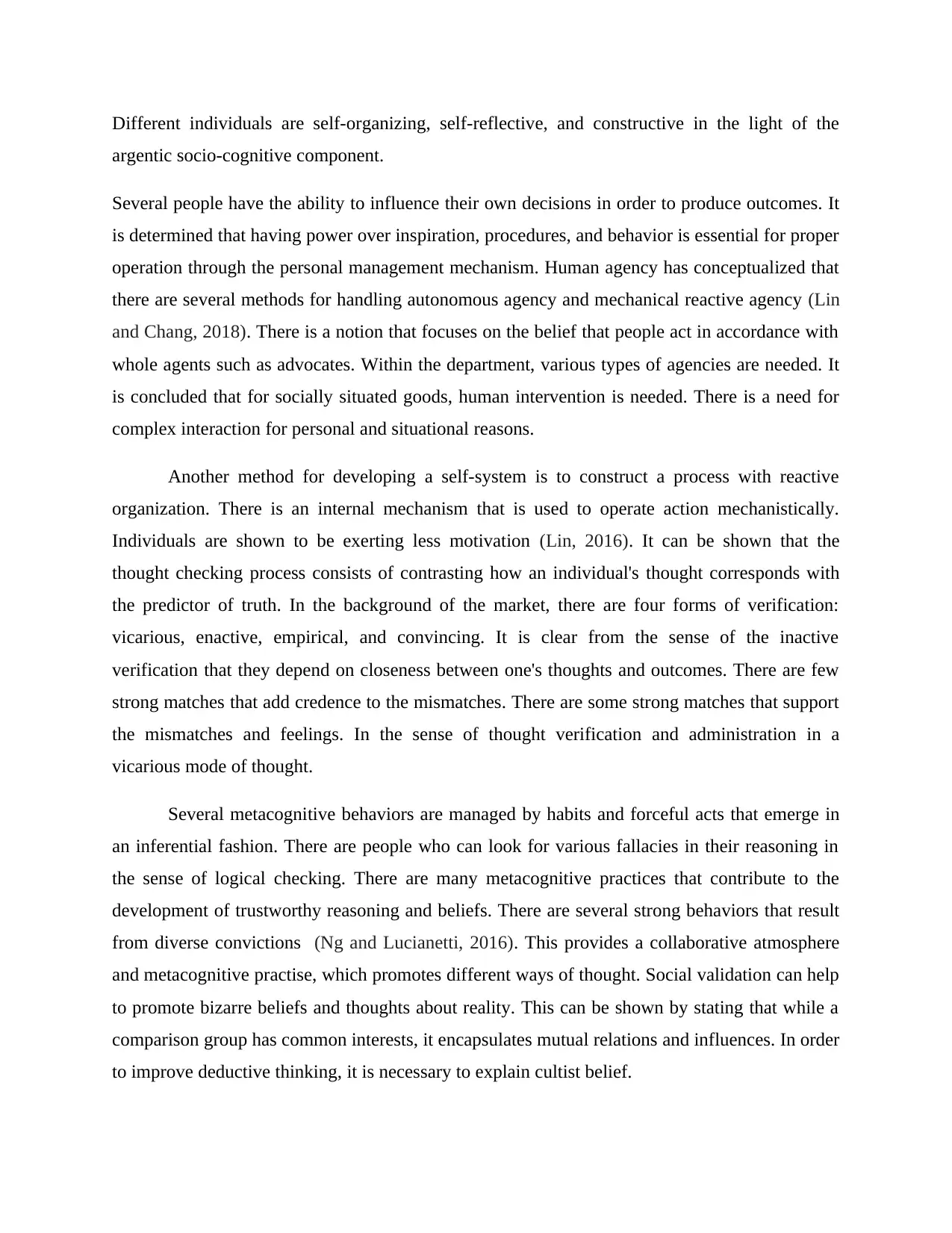
Different individuals are self-organizing, self-reflective, and constructive in the light of the
argentic socio-cognitive component.
Several people have the ability to influence their own decisions in order to produce outcomes. It
is determined that having power over inspiration, procedures, and behavior is essential for proper
operation through the personal management mechanism. Human agency has conceptualized that
there are several methods for handling autonomous agency and mechanical reactive agency (Lin
and Chang, 2018). There is a notion that focuses on the belief that people act in accordance with
whole agents such as advocates. Within the department, various types of agencies are needed. It
is concluded that for socially situated goods, human intervention is needed. There is a need for
complex interaction for personal and situational reasons.
Another method for developing a self-system is to construct a process with reactive
organization. There is an internal mechanism that is used to operate action mechanistically.
Individuals are shown to be exerting less motivation (Lin, 2016). It can be shown that the
thought checking process consists of contrasting how an individual's thought corresponds with
the predictor of truth. In the background of the market, there are four forms of verification:
vicarious, enactive, empirical, and convincing. It is clear from the sense of the inactive
verification that they depend on closeness between one's thoughts and outcomes. There are few
strong matches that add credence to the mismatches. There are some strong matches that support
the mismatches and feelings. In the sense of thought verification and administration in a
vicarious mode of thought.
Several metacognitive behaviors are managed by habits and forceful acts that emerge in
an inferential fashion. There are people who can look for various fallacies in their reasoning in
the sense of logical checking. There are many metacognitive practices that contribute to the
development of trustworthy reasoning and beliefs. There are several strong behaviors that result
from diverse convictions (Ng and Lucianetti, 2016). This provides a collaborative atmosphere
and metacognitive practise, which promotes different ways of thought. Social validation can help
to promote bizarre beliefs and thoughts about reality. This can be shown by stating that while a
comparison group has common interests, it encapsulates mutual relations and influences. In order
to improve deductive thinking, it is necessary to explain cultist belief.
argentic socio-cognitive component.
Several people have the ability to influence their own decisions in order to produce outcomes. It
is determined that having power over inspiration, procedures, and behavior is essential for proper
operation through the personal management mechanism. Human agency has conceptualized that
there are several methods for handling autonomous agency and mechanical reactive agency (Lin
and Chang, 2018). There is a notion that focuses on the belief that people act in accordance with
whole agents such as advocates. Within the department, various types of agencies are needed. It
is concluded that for socially situated goods, human intervention is needed. There is a need for
complex interaction for personal and situational reasons.
Another method for developing a self-system is to construct a process with reactive
organization. There is an internal mechanism that is used to operate action mechanistically.
Individuals are shown to be exerting less motivation (Lin, 2016). It can be shown that the
thought checking process consists of contrasting how an individual's thought corresponds with
the predictor of truth. In the background of the market, there are four forms of verification:
vicarious, enactive, empirical, and convincing. It is clear from the sense of the inactive
verification that they depend on closeness between one's thoughts and outcomes. There are few
strong matches that add credence to the mismatches. There are some strong matches that support
the mismatches and feelings. In the sense of thought verification and administration in a
vicarious mode of thought.
Several metacognitive behaviors are managed by habits and forceful acts that emerge in
an inferential fashion. There are people who can look for various fallacies in their reasoning in
the sense of logical checking. There are many metacognitive practices that contribute to the
development of trustworthy reasoning and beliefs. There are several strong behaviors that result
from diverse convictions (Ng and Lucianetti, 2016). This provides a collaborative atmosphere
and metacognitive practise, which promotes different ways of thought. Social validation can help
to promote bizarre beliefs and thoughts about reality. This can be shown by stating that while a
comparison group has common interests, it encapsulates mutual relations and influences. In order
to improve deductive thinking, it is necessary to explain cultist belief.
⊘ This is a preview!⊘
Do you want full access?
Subscribe today to unlock all pages.

Trusted by 1+ million students worldwide
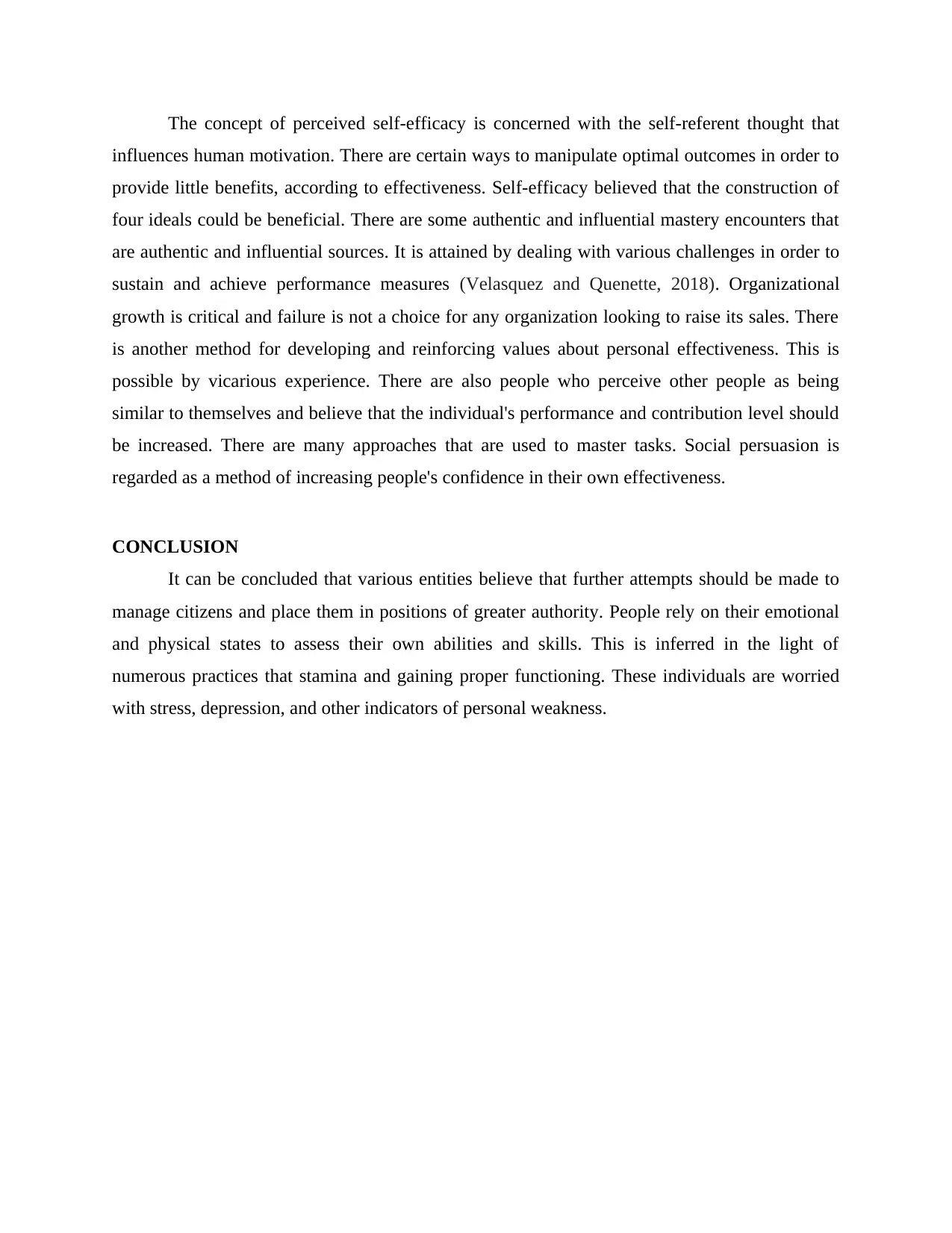
The concept of perceived self-efficacy is concerned with the self-referent thought that
influences human motivation. There are certain ways to manipulate optimal outcomes in order to
provide little benefits, according to effectiveness. Self-efficacy believed that the construction of
four ideals could be beneficial. There are some authentic and influential mastery encounters that
are authentic and influential sources. It is attained by dealing with various challenges in order to
sustain and achieve performance measures (Velasquez and Quenette, 2018). Organizational
growth is critical and failure is not a choice for any organization looking to raise its sales. There
is another method for developing and reinforcing values about personal effectiveness. This is
possible by vicarious experience. There are also people who perceive other people as being
similar to themselves and believe that the individual's performance and contribution level should
be increased. There are many approaches that are used to master tasks. Social persuasion is
regarded as a method of increasing people's confidence in their own effectiveness.
CONCLUSION
It can be concluded that various entities believe that further attempts should be made to
manage citizens and place them in positions of greater authority. People rely on their emotional
and physical states to assess their own abilities and skills. This is inferred in the light of
numerous practices that stamina and gaining proper functioning. These individuals are worried
with stress, depression, and other indicators of personal weakness.
influences human motivation. There are certain ways to manipulate optimal outcomes in order to
provide little benefits, according to effectiveness. Self-efficacy believed that the construction of
four ideals could be beneficial. There are some authentic and influential mastery encounters that
are authentic and influential sources. It is attained by dealing with various challenges in order to
sustain and achieve performance measures (Velasquez and Quenette, 2018). Organizational
growth is critical and failure is not a choice for any organization looking to raise its sales. There
is another method for developing and reinforcing values about personal effectiveness. This is
possible by vicarious experience. There are also people who perceive other people as being
similar to themselves and believe that the individual's performance and contribution level should
be increased. There are many approaches that are used to master tasks. Social persuasion is
regarded as a method of increasing people's confidence in their own effectiveness.
CONCLUSION
It can be concluded that various entities believe that further attempts should be made to
manage citizens and place them in positions of greater authority. People rely on their emotional
and physical states to assess their own abilities and skills. This is inferred in the light of
numerous practices that stamina and gaining proper functioning. These individuals are worried
with stress, depression, and other indicators of personal weakness.
Paraphrase This Document
Need a fresh take? Get an instant paraphrase of this document with our AI Paraphraser
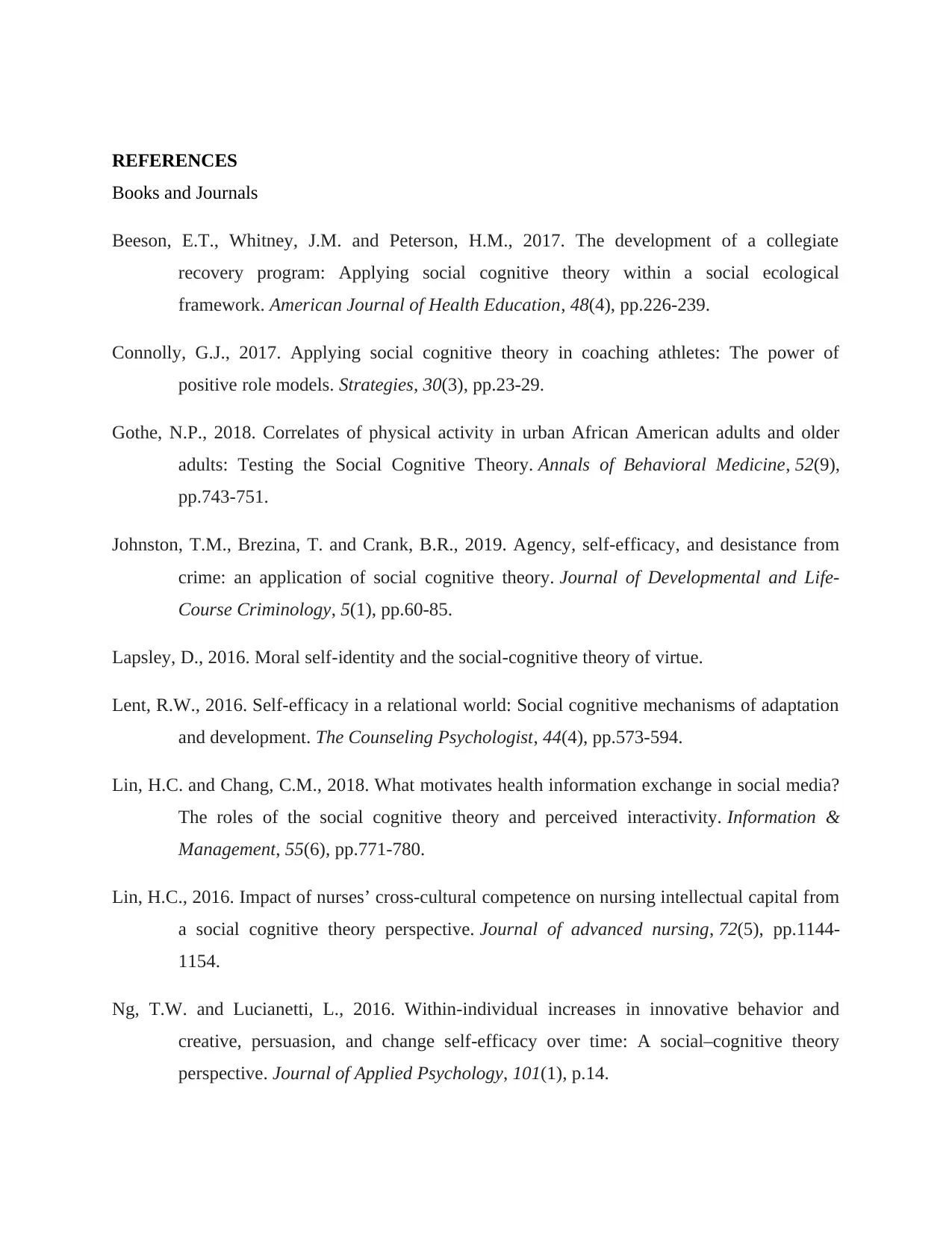
REFERENCES
Books and Journals
Beeson, E.T., Whitney, J.M. and Peterson, H.M., 2017. The development of a collegiate
recovery program: Applying social cognitive theory within a social ecological
framework. American Journal of Health Education, 48(4), pp.226-239.
Connolly, G.J., 2017. Applying social cognitive theory in coaching athletes: The power of
positive role models. Strategies, 30(3), pp.23-29.
Gothe, N.P., 2018. Correlates of physical activity in urban African American adults and older
adults: Testing the Social Cognitive Theory. Annals of Behavioral Medicine, 52(9),
pp.743-751.
Johnston, T.M., Brezina, T. and Crank, B.R., 2019. Agency, self-efficacy, and desistance from
crime: an application of social cognitive theory. Journal of Developmental and Life-
Course Criminology, 5(1), pp.60-85.
Lapsley, D., 2016. Moral self-identity and the social-cognitive theory of virtue.
Lent, R.W., 2016. Self-efficacy in a relational world: Social cognitive mechanisms of adaptation
and development. The Counseling Psychologist, 44(4), pp.573-594.
Lin, H.C. and Chang, C.M., 2018. What motivates health information exchange in social media?
The roles of the social cognitive theory and perceived interactivity. Information &
Management, 55(6), pp.771-780.
Lin, H.C., 2016. Impact of nurses’ cross‐cultural competence on nursing intellectual capital from
a social cognitive theory perspective. Journal of advanced nursing, 72(5), pp.1144-
1154.
Ng, T.W. and Lucianetti, L., 2016. Within-individual increases in innovative behavior and
creative, persuasion, and change self-efficacy over time: A social–cognitive theory
perspective. Journal of Applied Psychology, 101(1), p.14.
Books and Journals
Beeson, E.T., Whitney, J.M. and Peterson, H.M., 2017. The development of a collegiate
recovery program: Applying social cognitive theory within a social ecological
framework. American Journal of Health Education, 48(4), pp.226-239.
Connolly, G.J., 2017. Applying social cognitive theory in coaching athletes: The power of
positive role models. Strategies, 30(3), pp.23-29.
Gothe, N.P., 2018. Correlates of physical activity in urban African American adults and older
adults: Testing the Social Cognitive Theory. Annals of Behavioral Medicine, 52(9),
pp.743-751.
Johnston, T.M., Brezina, T. and Crank, B.R., 2019. Agency, self-efficacy, and desistance from
crime: an application of social cognitive theory. Journal of Developmental and Life-
Course Criminology, 5(1), pp.60-85.
Lapsley, D., 2016. Moral self-identity and the social-cognitive theory of virtue.
Lent, R.W., 2016. Self-efficacy in a relational world: Social cognitive mechanisms of adaptation
and development. The Counseling Psychologist, 44(4), pp.573-594.
Lin, H.C. and Chang, C.M., 2018. What motivates health information exchange in social media?
The roles of the social cognitive theory and perceived interactivity. Information &
Management, 55(6), pp.771-780.
Lin, H.C., 2016. Impact of nurses’ cross‐cultural competence on nursing intellectual capital from
a social cognitive theory perspective. Journal of advanced nursing, 72(5), pp.1144-
1154.
Ng, T.W. and Lucianetti, L., 2016. Within-individual increases in innovative behavior and
creative, persuasion, and change self-efficacy over time: A social–cognitive theory
perspective. Journal of Applied Psychology, 101(1), p.14.
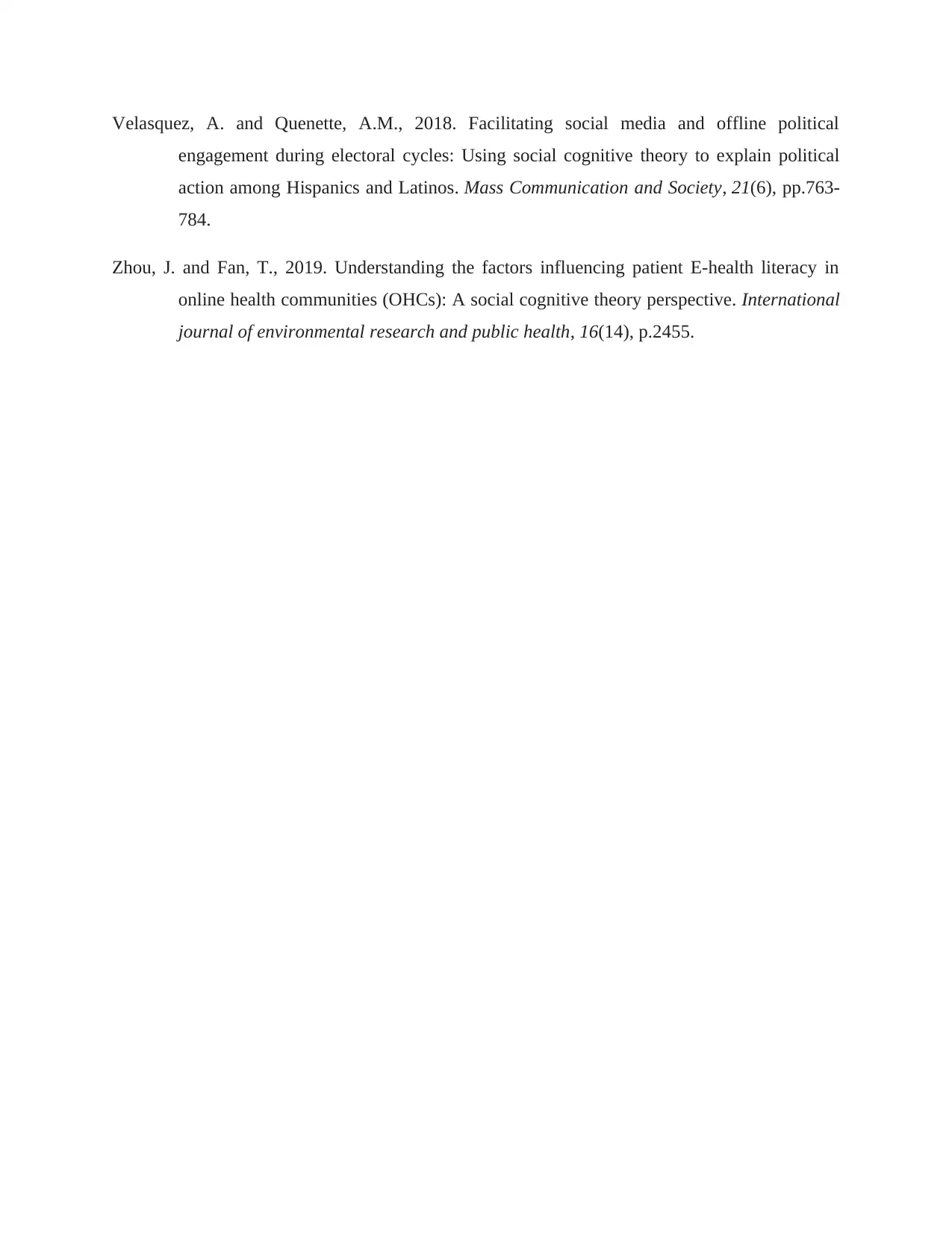
Velasquez, A. and Quenette, A.M., 2018. Facilitating social media and offline political
engagement during electoral cycles: Using social cognitive theory to explain political
action among Hispanics and Latinos. Mass Communication and Society, 21(6), pp.763-
784.
Zhou, J. and Fan, T., 2019. Understanding the factors influencing patient E-health literacy in
online health communities (OHCs): A social cognitive theory perspective. International
journal of environmental research and public health, 16(14), p.2455.
engagement during electoral cycles: Using social cognitive theory to explain political
action among Hispanics and Latinos. Mass Communication and Society, 21(6), pp.763-
784.
Zhou, J. and Fan, T., 2019. Understanding the factors influencing patient E-health literacy in
online health communities (OHCs): A social cognitive theory perspective. International
journal of environmental research and public health, 16(14), p.2455.
⊘ This is a preview!⊘
Do you want full access?
Subscribe today to unlock all pages.

Trusted by 1+ million students worldwide
1 out of 9
Related Documents
Your All-in-One AI-Powered Toolkit for Academic Success.
+13062052269
info@desklib.com
Available 24*7 on WhatsApp / Email
![[object Object]](/_next/static/media/star-bottom.7253800d.svg)
Unlock your academic potential
Copyright © 2020–2026 A2Z Services. All Rights Reserved. Developed and managed by ZUCOL.




